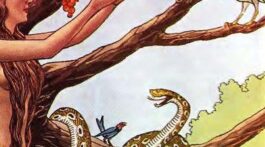Sabbath School Lesson for December 18-24, 2021
See a video about next quarter’s lessons on the book of Hebrews: https://youtu.be/2-Q5lWCc6-Y
Overview of Lesson 13
Coming to the end of Deuteronomy, we must take a look also at the end of Moses’ life. Each day this week brought discoveries about…
- the sin that caused Moses’ unusual experience with death (Sunday)
- a deeper look at Moses’ unfaithful act (Monday)
- how Moses died (Tuesday)
- how Moses was resurrected (Wednesday)
- how this relates to our own resurrection (Thursday)
Moses is the central human character in Deuteronomy. It is thought that Joshua, their next leader, wrote the final chapter, however, which might be thought of as his obituary, an account of his death. It does read much like an obituary of today: recording who he was, some details of his death, and how much he was missed by the children of Israel (Deuteronomy 34:8).
Memory Text: “Yet Michael the archangel, in contending with the devil, when he disputed about the body of Moses, dared not bring against him a reviling accusation, but said, ‘The Lord rebuke you!’ ” Jude 9 NKJV
There is a lot of mystery involved with this text and this story. A spiritual battle between Satan and the archangel Michael would be difficult to translate in human language. There was also mystery involving the circumstances of Moses’ death, the disappearance of his body, and later his appearance with Christ on the Mount of Transfiguration.
We humans are intimately intertwined with this story, because most of us will face an earthly death and welcome any sign that a resurrection of some kind awaits us as well.
Sunday: The Sin of Moses: Part 1
We realize that there must have been some kind of unfaithfulness in Moses’ life that caused him to be one of those who didn’t get to enter Canaan after forty long years in the wilderness. Apparently, only Joshua and Caleb, the faithful spies earlier in the story, along with the children born in the wilderness, were to have that privilege.
The reason for Moses’ exclusion is revealed in Numbers 20:12. Read more fully about this event in the first thirteen verses of this chapter. We sense here the anger of Moses for their rebellious accusations. He even calls them rebels (Numbers 20:10). Then in the next verse, Numbers 20:11, we find that he struck the rock twice, when God had clearly told him to speak to the rock (Numbers 20:8).
This unfortunate incident will be examined more closely in Part 2, but at least we can begin to see the justice in God’s decision to exclude Moses from entering Canaan at the end of their journey.
Bible Verses to Read and Discuss:
Numbers 20:1-13
- What had God told Moses to do, in Numbers 20:8?
- What did Moses do instead, Numbers 20:10, 11?
- What would be the consequence of Moses’ thoughtless act, Numbers 20:12?
Monday: The Sin of Moses, Part 2
Thinking more about the implications of that incident with the water at Meribah, we see that God was fair and just in excluding Moses from entering the Promised Land.
His striking the rock and speaking so callously to the congregation were enough to indicate his unchecked anger. He was not representing God in any way with such an act of defiance. He disobeyed God’s direct command by striking the rock; but the bold words that accompanied the act indicated that he was not giving God the full glory for giving them water. He used the pronoun “we” in Numbers 20:10. “Must WE bring water for you out of this rock?”, as if humans had anything to do with it at all.
Yes, such an outward sign of disobedience and unfaithfulness in front of the people could not be overlooked by God. But in the end, the people witnessed how the justice of God could be combined with His mercy, by the unusual way God handled the situation. His loving character was made manifest, despite Moses’ unfortunate mistake that day at Meribah.
Bible Verses to Read and Discuss:
Deuteronomy 31:2, 34:4
- Even though Moses wasn’t allowed to enter Canaan, what did God allow him to do?
- Why would seeing Canaan have been comforting to Moses, and what other emotions might he have had?
Numbers 20:8-10 and 1 Corinthians 10:4
- Why do you think they were told to take the rod? What did the rod represent?
- Who did the rock represent? Why was it wrong to strike the rock?
- Why were Moses’ words and actions such an unfaithful representation of God and a sign of his own rebellion?
Tuesday: The Death of Moses
Although Moses was comforted with the promise of Canaan, he was not to be blessed with its fulfillment by actually entering and occupying the prosperous land, described as flowing with milk and honey. The sight of it, compared with the wilderness he had endured for so long, must have been an emotional experience for Moses. We’ll never be sure what God actually showed him there on Mount Pisgah, but very likely it was of a supernatural nature. He no doubt envisioned His people as they would enjoy, but also struggle to survive, during their occupation of the land.
Deuteronomy 34:7 tells us the age of Moses when he died and the mysterious fact that “his eyes were not dim nor his natural vigor diminished”. Evidently, God had blessed Moses with unusual good health for a man his age. It would, therefore, have been an unexpected occurrence to all who learned of his passing.
God, though, had something better in store for his servant Moses. His justice was about to join His mercy with the final miracle God had reserved for His beloved friend.
Bible Verses to Read and Discuss:
Deuteronomy 34:1-12
- In what ways does this chapter sound like an obituary?
- How had God preserved Moses’ health right up to his death, and why?
Wednesday: The Resurrection of Moses
Although little is said about Moses’ resurrection, we do have reason to believe that it happened. It must have occurred before Christ, because it was he and Elijah who were with Jesus on the Mount of Transfiguration one night.
Elijah was seen by his successor, Elisha, going to heaven in a fiery chariot; but one must wonder about Moses’ presence with them on the Mount. He should have been resting in the grave, as so many other deceased are described in the Bible (2 Chronicles 9:31).
Joshua’s account of the event in Deuteronomy 34:6 indicates that Moses’ special resurrection may have occurred some time shortly after his death. Joshua reports that the Lord buried him, and no one could locate the grave.
Then there’s one mention of Moses’ body in Jude 9. This verse reveals that God’s Son was responsible for Moses’ resurrection. Christ and Satan had some kind on encounter about it, and, of course, we know who won the argument.
Because of their special love bond, God wanted Moses with Him in heaven. It was a perfect example of His love and justice equally displayed, and what grace really means: receiving something we don’t deserve.
In addition, seeing these two prophets on the Mount of Transfiguration was significant, as they represented those at the Second Coming who will not see death, like Elijah, and those who have died before His Coming and are resurrected, like Moses.
Bible Verses to Read and Discuss:
Deuteronomy 34:5, 6
- Why do you think God performed a resurrection miracle for His friend Moses?
Jude 9
- Why did Michael, who is thought to be Christ, confront Satan about what to do with Moses’ body?
Thursday: The Resurrection of Us All
Enoch and Elijah were both mentioned as having gone to heaven without seeing death. But Moses is the first known person in Bible history to have been resurrected from death and gone to heaven. This miraculous occurrence speaks volumes of the relationship Moses had with God. Despite his failings, Moses maintained a special bond that made him a candidate for a special resurrection.
We, alive on the earth today, will join those faithful ones who have gone before us in death. We either wait for that event, alive and serving Him on this sin-laden planet; or we wait for Him, resting in the grave. See 1 Thessalonians 4:16, 17.
The belief that God’s servant Moses and others, like Lazarus, have already been miraculously resurrected gives us even more hope and desire to be with our Savior in heaven. Because of what Christ did for Moses, we have ample reason for a faith that includes a happily-ever-after ending for us, too, with an eternity in heaven.
Bible Verses to Read and Discuss:
Genesis 5:24 and 2 Kings 2:11
- What reasons might there have been for God to deliver these two servants without them seeing death? What ordeals had they gone through?
- Who else at the Second Coming will be in the category of those who don’t experience death?
1 Thessalonians 4:13-17 and Acts 1:9-11
- What comfort is there that the dead and living at the time of Christ’s return will meet and be with Him together in the clouds, just as Jesus returned to heaven at His ascension?
Friday: Final Thoughts
There is a distinct literary pattern in the Bible that consists of a beginning and an end. This technique is noticed in the structure of the whole Bible, and the individual Testaments. In addition, many books of the Bible follow this pattern. Some examples are Genesis (which ends with the death of Joseph), and the gospel of John (ending with Jesus’ death). Even groups of books, like the five books of Moses, begin with Creation, and end with the death and resurrection of God’s servant Moses, elevating the spiritual importance of that event as well.
God wants us to have the whole story in various ways and contexts, so we can choose to follow Him. Knowing the final outcome is just as important as knowing the beginning. In between, God reveals everything we need for salvation in the pages of His holy word.
We should be aware of the resurrection of the dead and understand its certainty. For almost all of us will experience a resurrection, whether it be the resurrection of the faithful or the resurrection of the wicked, which is followed by the second death (Revelation 20:14). We determine our own fate of life or death, but God provides us with the information needed to make decisions that will last an eternity.
It’s possible for us to join Moses in heaven someday. How we long for that grand and glorious day when Jesus comes to take us all home with Him!
Next Week: The Letter to the Hebrews and to Us
To read the Sabbath School Lesson Quarterly or see more resources for its study, go to








